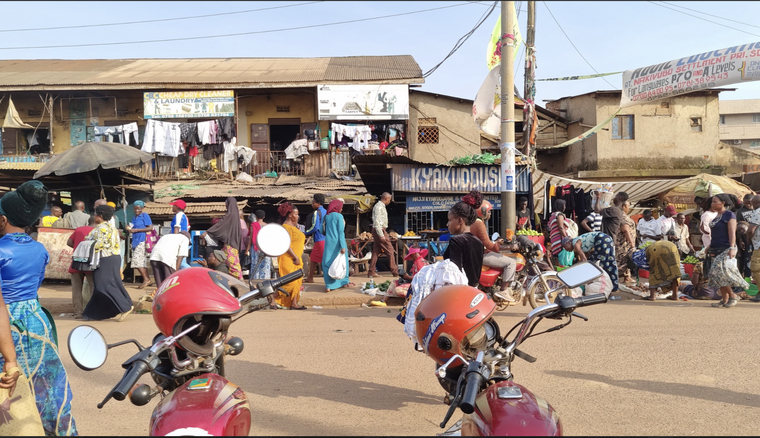‘Smart City’ plans and ‘bad optics’
Enforcement of the city’s illegal trading laws has intensified since the city authority’s 2020 launch of the ‘Smart City’ plan – under the leadership of current KCCA executive director Dorothy Kisaka – seemingly in line with the United Nations programme aiming for fast growing Global Southern cities to be turned into “inclusive, liveable, and sustainable urban areas”.
Hawkers who are arrested on suspicion of illegal trading face up to six months in prison or pay fines in excess of 400,000 Ugandan shillings, which vendors and rights campaigners have called “prohibitive”. While the size of the street economy in Kampala is unknown, their associations put their number at more than 10,000, mostly economically vulnerable women operating in downtown Kampala.
In October 2022, KCCA director Kisaka reported a 16% revenue growth for the city in the preceding financial year, with 47% of the cash coming from property taxes. Simon Kasyate, the spokesperson of KCCA denied that any significant percentage had come from fines against street vendors.
As part of its Smart City ambitions and in a bid to get hawkers and vendors off the streets, the KCCA created a new market in 2022 – but it is not fit for purpose.
The authority had advertised “free stalls” – but what vendors were actually given was a bare piece of land. It was not really “free”, either: vendors say they were asked to pay 90,000 Ugandan shillings for the wood and timber to set up the stalls.
In addition, the KCCA bans children from markets even though the vendors are mostly single mothers with no viable alternatives for childcare. Susan Birike, a single mother of four who sells porridge and tea, told us: “I fear all the time that my children will get burnt, but I have nowhere to leave them.”
Birike often works over hot charcoal stoves and saucepans of food, sometimes with her four-month-old baby. Her other daughters, aged 11 and seven, help her prepare the drinks and serve customers.
“I wish KCCA could find us a small safe place where we can keep our babies during the day,” she said.
Kasyate said the ban on children at markets was for the sake of safety. He dismissed the vendors’ requests for daycare services, saying: “Next they are going to ask why there are no free burger serving spaces.”
The market has no sanitary facilities, with more than 1,000 vendors forced to pay to use nearby toilets instead. But Kasyate dismissed the notion that KCCA should provide its own.
“Make a charity and pay for them but do not expect the taxpayer of Uganda to start paying for toilet services in a public market,” he said.
The KCCA’s targeting of hawkers is a “criminalisation of poverty”, according to Ruth Ssekindi, the director of monitoring and investigations at the Uganda Human Rights Commission.
“The way law enforcement deals with these women and poor youth is really dehumanising,” she added.
No accountability
The KCCA has long faced calls to take responsibility for its officers’ actions.
In 2017, Olivia Basemera, a 38-year-old single mother of three, fell into a sewer hole while running away from KCCA enforcement officers. She drowned. After years of calls for accountability, in 2021, the KCCA reportedly detained four of its officers who were linked to Basemera’s death.
In 2020, Lowena Nankya – then 19 – was hit by a rubber bullet during an enforcement operation in the city by KCCA officials, injuring her and leading to the loss of several teeth. Despite sustained online campaigns by top journalists and activists under the hashtag #JusticeForLowena, KCCA has yet to compensate the family or pay for Nankya’s dental reconstruction for Nankya even after the city authority claimed responsibility.
Most recently, Juakali Initiative has complained to the KCCA requesting an immediate investigation into Mutuwa’s case, as well as medical care for her. The complaint reiterates Mutuwa’s claim that she was “chased by KCCA law enforcement officers, resulting in a fall into boiling cooking oil”. The KCCA has not responded.
Vendors who spoke with openDemocracy on condition of anonymity said they had asked the KCCA to deploy more female officers to help curb the gendered mistreatment of female vendors, but have received no response.
KCCA spokesperson Kasyate refuted the claim that female vendors were targeted by male officers, calling accusations of gendered violence “unsubstantiated”. He said about 35% of the enforcement officers deployed by the KCCA were women – and that, overall, KCCA officers acted within their powers when enforcing the law. The gender make-up of KCCA officers is not publicly available.
“Our officers have the power mandated to them by the law and it is that power that should make the vendor subservient when they come to be arrested. [It is] not for [the vendors] to attack [officers] and then come and play victim,” he said. He did not substantiate the claim that any vendors had attacked officers.
Kasyate also said that he was aware that Mutuwa had been burnt by cooking oil, but that an investigation into what exactly happened was still ongoing.
Although some officers wear body cameras to help collect evidence during arrests, Kasyate admitted there were no recordings of the alleged assaults of Mutuwa and Nakayaga.
In July 2023, KCCA director Kisaka warned officers during a passing-out ceremony that “misusing [self-defence] skills tarnishes the name of the institution”.
openDemocracy approached her for comment on the claims made in this article but received no response.


Comments
We encourage anyone to comment, please consult the oD commenting guidelines if you have any questions.